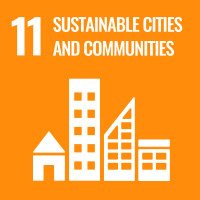Meet the Writers: Jack Ward
April 22, 2022

SDG 11: Sustainable Cities and Communities
The goal of the global scholars program has always been to help Purchase students develop into global citizens. To do that, we have spent the last year and a half trying to figure out what a global citizen is and how they act. A relatively new term, I believe a global citizen is one whose identity transcends the borders set by our governments, geographically and culturally. In the context of the Global Scholars seminar, a global citizen is also one who helps realize the sustainable development goals (SDGs) set by the United Nations. These can include fighting hunger, reducing poverty, or building sustainable cities. Because there are so many SDGs available, there are a myriad of ways to contribute to their realization.
I have personally found fulfillment volunteering with disaster relief programs and affordable housing projects. To me, the goal of building sustainable cities lies between reducing poverty, promoting good health, access to clean water, and promoting economic growth. In some cases, like a Habitat for Humanity project on Long Island I helped work on, the house was to be heated geothermally, promoting clean energy and waste reduction. When someone contributes to their community, their actions impact both the primary target of their efforts, as well as a web of secondary goals.
However, there lies criticism in the concept of global citizenship, which is tied to the reality of wealth and power. Truthfully, those that I met while volunteering were predominantly white people from wealthy countries. This begs the question: is Global Citizenship attainable only to those who have the privilege and resources to do so? If so, does it contradict itself as an inclusive term and does it serve primarily as a means for white-saviorism?
It is a question I have considered a lot, being a white man from a wealthy area who engaged in travel volunteering (aka, ‘voluntourism’). I think that global citizenship should be detached from the lens of self-improvement, so we can perceive it as something beyond a time and financial commitment that is not accessible to everyone. Instead, I think global citizenship can be applied to anyone trying to make a positive improvement in their community. Starting a community garden, working at a soup kitchen, or organizing a neighborhood cleanup could all be viewed as acts of global engagement. Since being confronted with my own privilege while volunteering, I have tried to make conscious decisions to act internally in my community more often, which has helped me find more outlets for engagement (my current favorite being farm work for a Long Island food bank).
In her address to the Global Scholars seminar, Queen Mother Dr. Dòwòti Désir described the topic of globalization as akin to a ‘porous surface’ where cultures can share their customs and traditions while maintaining their own individual identities. As the global scholars (both the students and the course) continue to develop and change, I hope that we can all learn how best to contribute to the global community, understand its history, customs, and values; and find our place in it as global citizens.
2020 Cohort– Editorial Committee ’21-’22
